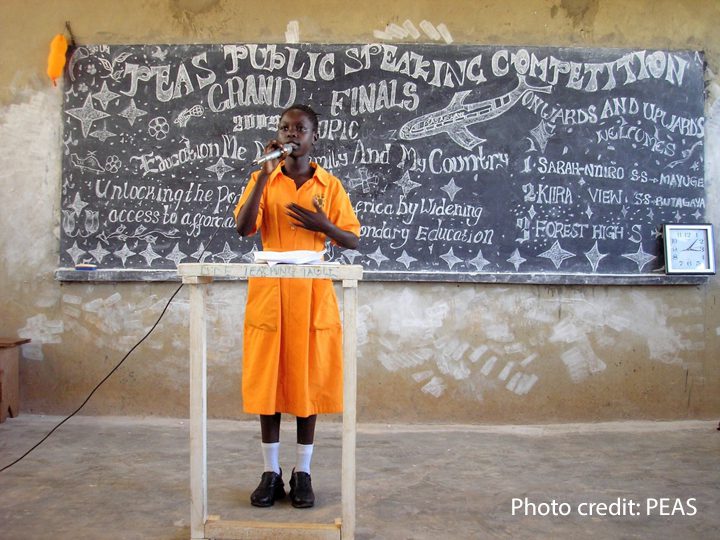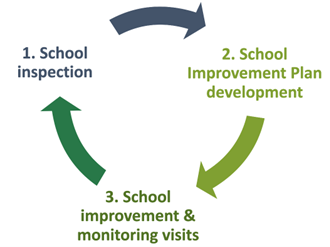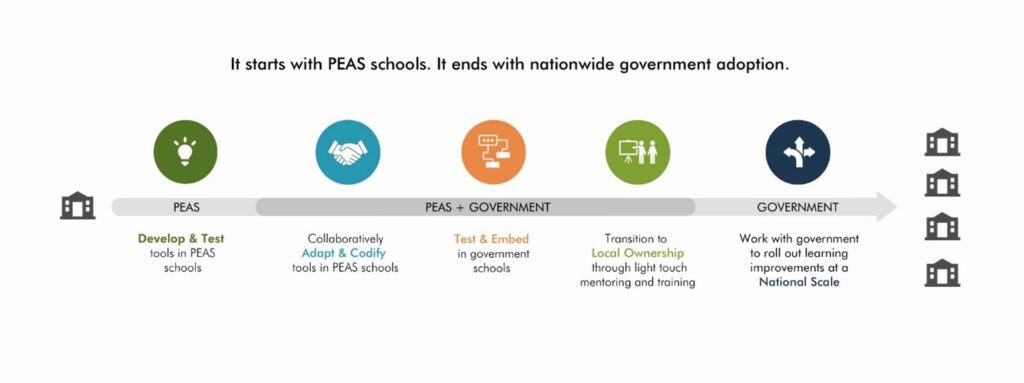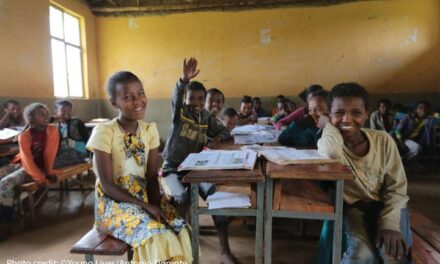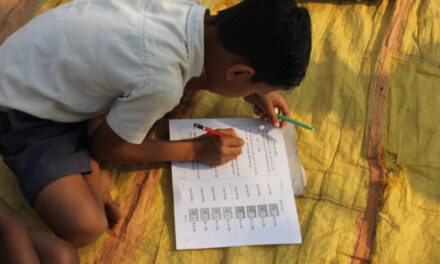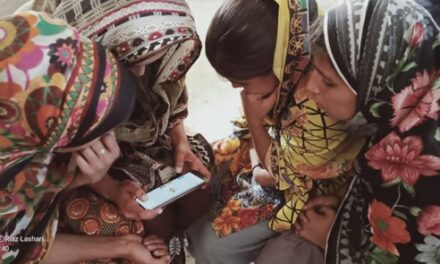This blog is the first in a new series from Promoting Equality in African Schools (PEAS). It was published on the PEAS website on 19 April 2023.
In 2023, PEAS will support the education of 190,000 young people through our system strengthening work. Today we are launching a blog series on what we have learned so far from working with the governments in Uganda and Zambia.
We have been delivering high-quality, inclusive secondary education in low-resource contexts for 15 years. And since 2019, we’ve worked with governments in Uganda and Africa to bring together district education officers and school leaders into vibrant local networks, passionate about school improvement.
Over the next few weeks, we will be sharing blogs and films with our insights on our approach to strengthening the wider education system through partnering with governments, digital innovations we’ve created, what works in system strengthening, and latest evidence from our partnerships.
Why are we doing it?
We believe all students deserve a quality education, not just students at PEAS schools. That is why we partner with governments to strengthen education systems. We want stronger, more inclusive education systems at every level. Where top priority is given to student safety and high-quality learning. And where educators throughout the countries we work in are given the tools and support needed to make a difference.
We began working with governments and other partners to transform how secondary education is delivered across sub-Saharan Africa. We want to work in Uganda, Zambia, and across the region to ensure that as many young Africans as possible benefit from a relevant and high-quality secondary education.
How does it work?
Our innovative approach brings together district education officers and school leaders into a vibrant local network, passionate about school improvement. They focus on what they can change, not what they can’t.
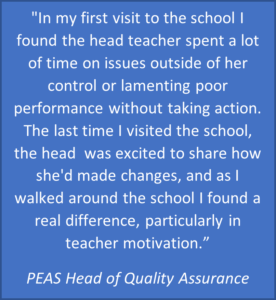 In practice, this means working with district education officers and leaders to take action that will make a big difference to their schools and fit within their existing budget. That might be setting up clear child protection policies, holding school-based staff training, and increasing lesson observations to better monitor teaching quality. We have found that this approach means school leaders grow in confidence – they know their plans are achievable and that the challenges they meet can be overcome.
In practice, this means working with district education officers and leaders to take action that will make a big difference to their schools and fit within their existing budget. That might be setting up clear child protection policies, holding school-based staff training, and increasing lesson observations to better monitor teaching quality. We have found that this approach means school leaders grow in confidence – they know their plans are achievable and that the challenges they meet can be overcome.
And our annual digitised school improvement process means district education officers keep up that consistent support, year in year out, so those big changes stick.
Working with governments, these local networks are being embedded in national systems and replicated across the country to improve education for all young people.
How do school leaders drive change?
Our evidence shows school leaders are uniquely placed to improve their schools. A good school leader drives change in their school through teachers, parents, and students. Our schools are proof that with the right support and tools, school leaders can improve: 1) student safety, 2) quality of teaching and learning and 3) use of resources. These three things deliver better student outcomes.
A school leader we worked with shared: “PEAS taught administrators to make a School Improvement Plan (SIP), having in mind the limited resources that the school has, not going beyond these resources. The SIP enabled them to economise and yet move forward.”
Why PEAS?
We combine our first-hand experience of running secondary schools with a systems mindset. We use the tools, team, and experience we have built up after 15 years of running some of the best secondary schools in Uganda and Zambia to support other schools and governments. We address the root causes for why an education system is not delivering equity, access, and quality rather than delivering standalone programmes that only address an immediate, surface-level need.
Our approach moves beyond just policy development. In the places where we work there are often good policies in place. However too often these policies are not translated into improvements in practice and behaviour change. As expert secondary practitioners, we are well-placed to help bridge the gap between policy and practice. We can provide unique insight into any policy gaps that do exist and provide hands-on support to governments to demonstrate how to implement policy.
What does this look like in practice?
PEAS Uganda and the Directorate of Education Standards (DES) have been working to improve school-level support and supervision structures since 2019, through the Inspect & Improve programme. This innovative collaboration brings together the government’s reformed inspection framework and PEAS’ approach to follow-up support for school leaders to drive improvements in government secondary schools.
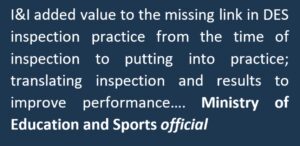 The Inspect & Improve programme uses collaborative inspections to identify schools’ strengths and areas for development. This data is used to support leaders to create evidence-based School Improvement Plans, focusing on what practical strategies they can put in place that will drive improved outcomes.
The Inspect & Improve programme uses collaborative inspections to identify schools’ strengths and areas for development. This data is used to support leaders to create evidence-based School Improvement Plans, focusing on what practical strategies they can put in place that will drive improved outcomes.
Then schools receive follow-up support and monitoring through visits and phone calls. Peer support systems using WhatsApp and learning visits help leaders learn from each other and hold each other to account.
Scaling and sustaining beyond PEAS
We approach our work in three phases to ensure our solutions can be scaled and sustained by our government partners.
Phase 1: We work with governments to understand key issues preventing the delivery of access, quality, and sustainability at the secondary school system level. We co-design a solution and then co-deliver a pilot with government teams.
Phase 2: If the pilot shows promise we then collaborate with the government and partners to grow the intervention to reach approximately 10% of the system to demonstrate what works at scale.
Phase 3: We will then transition from co-delivery with governments, to government-led delivery that can be sustained and deliver impact for all young people.
If you’re interested in finding out more about our systems strengthening work, please contact info@peas.org.uk. If you would like to support our work, please contact partnerships@peas.org.uk.

